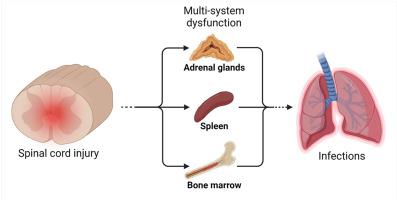Current Opinion in Pharmacology ( IF 4 ) Pub Date : 2022-04-27 , DOI: 10.1016/j.coph.2022.102230 Kyleigh A Rodgers 1 , Kristina A Kigerl 2 , Jan M Schwab 3 , Phillip G Popovich 4

|
Infections impair neurological outcome and increase mortality after spinal cord injury (SCI). Emerging data show that pathogens more easily infect individuals with SCI because SCI disrupts neural and humoral control of immune cells, culminating with the development of “SCI-induced immune deficiency syndrome” (SCI-IDS). Here, we review data that implicate autonomic dysfunction and impaired neuroendocrine signaling as key determinants of SCI-IDS. Although it is widely appreciated that mature leukocyte dysfunction is a canonical feature of SCI-IDS, new data indicate that SCI impairs the development and mobilization of immune cell precursors in bone marrow. Thus, this review will also explore how the post-injury acquisition of a “bone marrow failure syndrome” may be the earliest manifestation of SCI-IDS.
中文翻译:

脊髓损伤后的免疫功能障碍——自主神经和神经内分泌机制综述
感染会损害神经系统结果并增加脊髓损伤 (SCI) 后的死亡率。新出现的数据表明,病原体更容易感染 SCI 患者,因为 SCI 会破坏免疫细胞的神经和体液控制,最终导致“SCI 诱导的免疫缺陷综合征”(SCI-IDS) 的发展。在这里,我们回顾了将自主神经功能障碍和神经内分泌信号受损作为 SCI-IDS 关键决定因素的数据。尽管人们普遍认为成熟白细胞功能障碍是 SCI-IDS 的典型特征,但新数据表明 SCI 会损害骨髓中免疫细胞前体的发育和动员。因此,本综述还将探讨损伤后获得的“骨髓衰竭综合征”如何可能是 SCI-IDS 的最早表现。


























 京公网安备 11010802027423号
京公网安备 11010802027423号